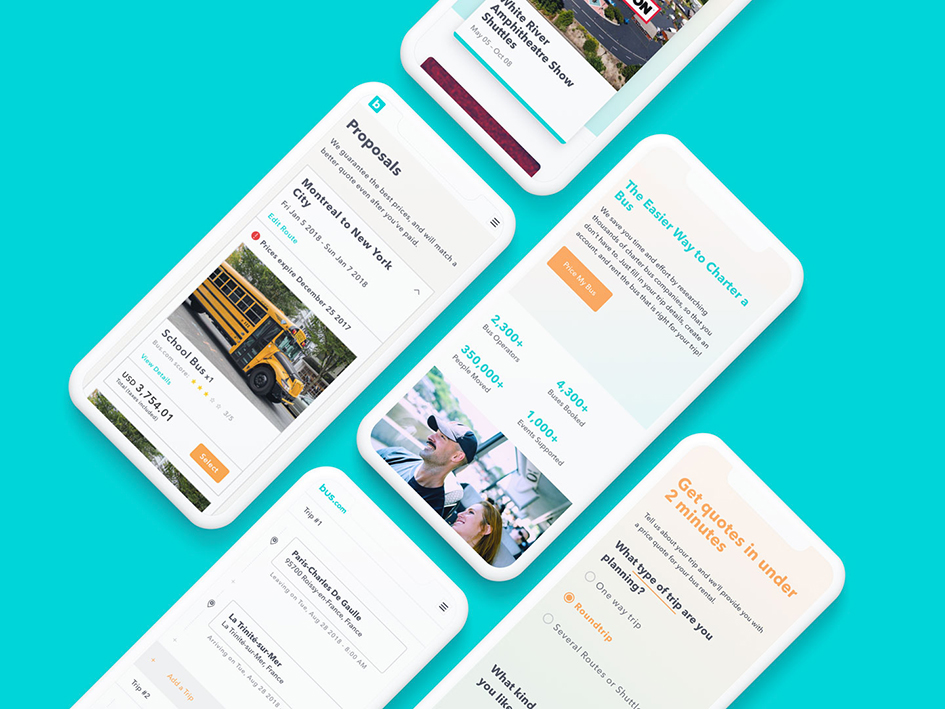If there’s one downside to organizing a music festival, a major sporting event, or a group trip, it’s finding an affordable and reliable way to get people from point A to point B. Bus.com is transforming the transportation industry by solving all these problems and more, and its use of Salesforce is just one example of why the company has become so successful.
A complex and fast growing marketplace
Bus.com connects customers with bus companies, enabling them to plan and schedule group charter bus trips as needed. In addition to online rental and ticketing, Bus.com also offers GPS tracking of buses allowing passengers to know exactly when they’re arriving.
Based in Montreal, Bus.com rebranded from its former name, Sharethebus, in 2017, and has been experiencing rapid growth. It became obvious that their expanding teams needed software that would help them collaborate, and give them real-time sales visibility -- and they needed it fast.

According to Martin Provencher, Bus.com’s CTO, the company doesn’t see itself as merely providing a set of services, but a complete transportation experience -- one focused on making it easy, economical and enjoyable to charter a bus. That’s why, from managing the initial conversations with customers to fulfilling their expectations, Bus.com has come to rely on Sales Cloud as an essential tool.
“Every route is a custom order,” he explains. “Depending on what the customer wants, we need to be able to find the right bus supplier and the right route for their experience. There can be risk around getting those orders right. We’d been able to manage that on our own, but as we began to scale our business, we needed business software that was more flexible than most of the other applications that were out there.”
Real-time transparency about sales
From an internal perspective, meanwhile, the Bus.com team was also becoming increasingly focused on offering greater transparency and accessibility around customer information across the organization. According to Baktash Amiri, Senior Director of Sales Operations, Sales Cloud has been instrumental in making information available in real-time for the entire team.
“We need to know how many leads are coming from our platform, the quality of those leads, how many calls our reps are making to those customers, and the win rates,” he says, adding that the data derived from these tools also suffered from inconsistency and potential for errors. “Before Salesforce, it was only possible to achieve this through internal tools, which were a lot slower.”

A speedy, successful implementation
While some organizations see moving to something as powerful as the world’s No. 1 CRM as a big, complex project, Bus.com offers proof of how organizations of all sizes can work quickly to achieve major results. In fact, Bus.com managed to implement Salesforce in only 30 days, a feat Provencher attributes to a strong up front communications approach.
“We didn’t want to spend a long time in transition mode. Everyone in the business was aligned with the plan,” he says. “When things were going forward, they were involved every step of the way.”

Amiri says Provencher’s vision helped ensure he and his staff would be ready and eager to use Salesforce from Day 1.
“We created some really great excitement for the sales team,” he says. “We didn’t wait to introduce it to them once it was installed -- we showed them demos and talked a lot about how it would facilitate things they wanted do in their day-to-day work.”
The road ahead for Bus.com
Having been live on Salesforce since February of 2018, the Bus.com team has been equally quick to see results.
In the past, for example, Amiri says Bus.com was reliant on Business Insights department staff to produce reports. Now anyone can use CRM to build their own reports with data that’s always centralized and up to date. The accessibility of Salesforce also means this can happen at the manager level, without having an impact on front-line productivity, Provencher adds.
“You don’t want to interrupt people by saying, ‘Stop working so you can give me that report I need as a manager.’ That should never happen,” he says.

The reporting Bus.com looks at today doesn’t just give the organization a look at how its business is performing at a given moment, though. Amiri says using Salesforce means the organization can focus on continuous improvements that will ultimately fuel its growth.
“We’ll look at a lot of the processes -- when leads come in, for example, how do we follow up?” he says. “We’re also able to measure success across the team, and easily provide training for recent hires and coaching for senior employees. We have the visibility we need to make us a better sales organization, and are better equipped to reach our target month over month.”
The benefits of Salesforce extend far beyond sales, of course. Provencher says Bus.com has also used tools such as Pardot along with Sales Cloud to help monitor and optimize key performance indicators (KPIs) in areas such as customer service, customer success and marketing.
“When people are using the Salesforce platform and tools, it gives us the data to analyze how we’re doing, so we know we’re always performing better,” Provencher says.
After only a month getting the technology in place, Bus.com is ready to move its growth plan into high gear.



